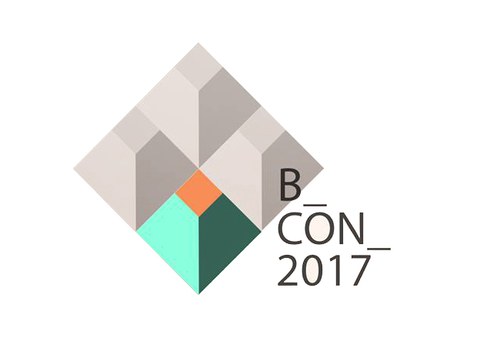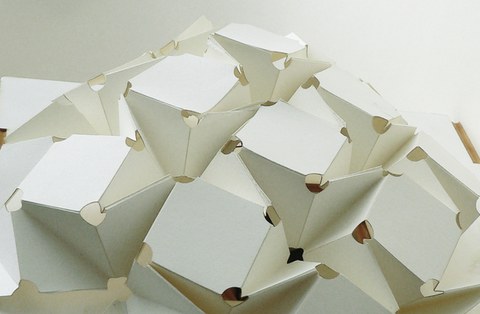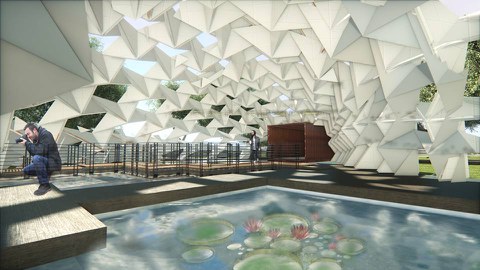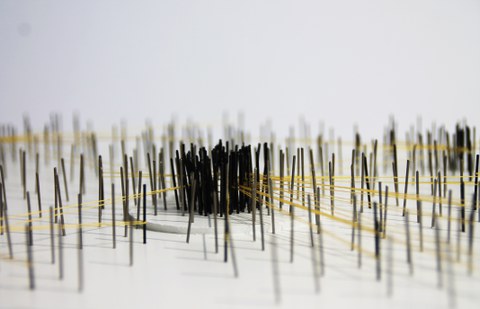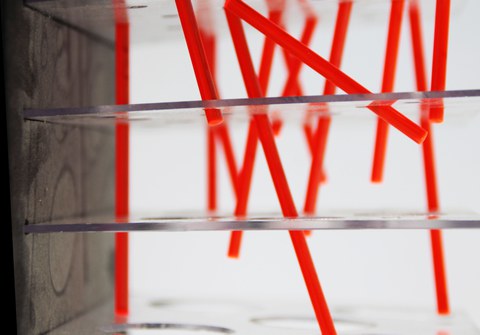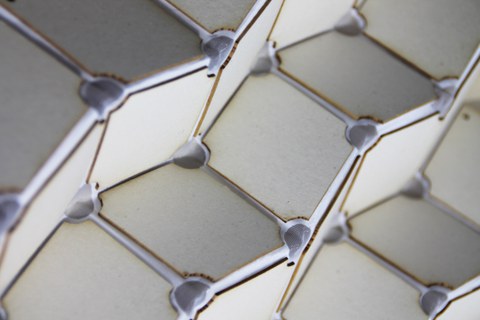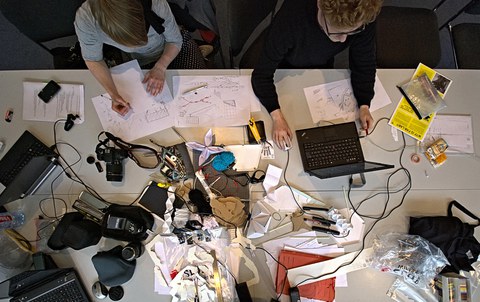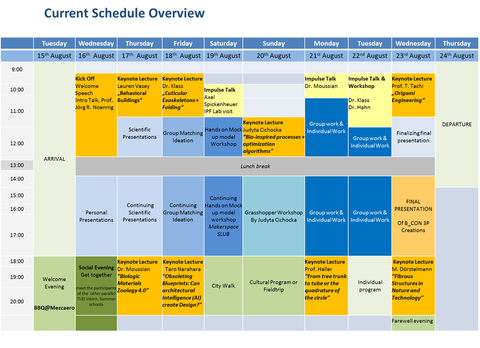CONSTRUCTION BIONICS
The International Summerschool "Construction Bionics" at TU Dresden invites up to 20 excellent young researchers, PhD-students and PostDocs from all over the world with an interest in biology, material science, civil engineering, design, construction and robotics to explore future trends in bio-inspired construction processes.
With the application to the summer school, candidates automatically apply for a refund of up to 90 % of the travel costs. Candidates will be informed about the exact funding with the letter of acceptance.
Funding is made possible by the Excellence Initiative of the German Federal Government.
Contact
Prof. Dr.-Ing. Jörg Rainer Noennig |
Summer School Director
Organizing Committee:
TU Dresden - Faculty of Architecture - Laboratory of Knowledge Architecture
Dipl.-Ing. Anja Jannack Dipl.-Ing. Sebastian Wiesenhuetter
Tel.: +49 351 463-32210
TU Dresden - Zentrum für Bauforschung - ZfBau
Dipl.- Ing. Magdalena Tarkiewicz
E-Mail:
Telefon: +49 351 463-36774
tu-dresden.de/zfbau
Topics
Bionics in Architecture and Construction
Drawing inspiration from natural principles for Architecture and Construction enables new ways of natural form finding, resource efficiency and sustainability. The entire design approach is undergoing a dramatic paradigm shift right from conception, throughout planning until fabrication. New Methodologies are required for the interdisciplinary collaboration between scientists from different fields and engineers, planners and designers in order to establish an integrative and holistic approach.
Pioneers as Buckminster Fuller and Frei Otto have led the way by formulating a comprehensive "Design Science" and translating scientific knowledge into visionary projects. However the ongoing digitalisation brings enormous new potential through robotics and digital fabrication together with algorithmic design approaches.
Smart Processes&Dynamics
In nature complexity emerges from systems behaviour made up of simpler entities. To mimic these phenomena the field of information bionics (e.g. neurobionics, evolution bionics, process bionics, and organization bionics) looks at the underlying principles. Parametric Design is able to incorporate these principles into the design process. The interrelation of the design elements is focused rather than the actual shape of objects. This enables the designer to encode rules and principles in which the design can dynamically emerge within carefully set boundaries and preconditions.
Principles such as Evolutionary Algorithms, Adaptive Growth and Multi-Agent-Systems enable architects and engineers to benefit of the emergent qualities of nature.
The resulting complexity can be handled by integrating digital fabrication closely into the process. Thus construction and design phase can not be regarded separately but start to merge into each other as demonstrated by nature where the processes occur simultaneously as one.
Material Bionics
Material Science tremendously contributes to bio-inspired innovations through understanding of the phenomena at the Micro-Level. Lightweight-Construction based on fibre-reinforced composite materials enables entirely new forms of construction. Material Design can precisely adjust the mechanical properties to the specific requirements. Thus entirely new properties of the building components can be achieved, such as: responsivity to the environment, resource and energy efficiency, self-repair and recyclability.
Concrete can be used as a gradient composite of matrix and filler in order to precisely adjust the properties according to the flow of forces within the building component. Further through understanding of behaviour of concrete during 3D-Printing along with reinforcement complex structures are enabled.
High performance textiles play a key role in many of the innovative material sytems. Fibrous materials are virtually omnipresent in biological systems. For example the traditional building resource wood can be interpreted entirely new through better understanding of the phenomena at the Micro-Level. Plants in nature demonstrate the versatility of fibre-based construction which is also largely based on the right placement of the fibres within a structure.
Smart Structures
Biological structural elements are precisely suited to the prevailing conditions. The composition and arrangement of materials within the building components are shaped according to the mechanical forces and loads. The topology is optimised to obtain high performance while high resource and energy efficiency. Building parts often serve a multitude of functions at the same time, allowing movement and adaptation to changing environmental conditions.
While deployable structures for example can be achieved by principles of Folding or lightweight structures through new techniques of "Joinery" or tensile structures an enormous potential also lies in bio-inspired Concrete Structures through the use of textile-fibre-reinforcement.
Programme
The summer school programme focuses on cross-disciplinary project work and interactive workshops. Theoretical input will be delivered in keynote speeches from renowned international scholars and practitioners. Additional impulse lectures will be given by TU Dresden faculty members of the departments: Architecture, Civil Engineering, Environmental Sciences, Biology.
Working language of the summer school is English.
Schedule
The schedule of the summer school is to be updated constantly. However, we will keep you informed on this site.
Keynote Lectures
Keynote Lectures
Participants
Participants
Venue
The Bionics Summerschool takes place at Technische Universität Dresden, School of Civil and Environmental Engineering.
The TU Dresden is one of eleven German universities that were identified as an "Excellence University". TUD has about 37.000 students, 4.400 publicly funded staff members – among them over 500 professors – and approximately 3.500 externally funded staff members, and, thus, is the largest university in Saxony, today.
Having been committed to sciences and the engineering before the reunification of Germany, TU Dresden now is a multi-discipline university, also offering humanities and social sciences as well as medicine.
The main part of the summer school will take place at the Bürogebäude Zellescher Weg of TU Dresden.
Here you can find a campus map of TU Dresden.
Funded by
The interdisciplinary summer school is funded by the Excellence Initiative Program launched by the German federal and state governments which supports eleven German “Universities of Excellence”. Therefore we offer excellent PhD-students scholarships.
Accomodation
Important note:
- Accommodation costs of international participants are covered entirely by TU Dresden (5-/6-bed multi-shared rooms including breakfast) at the Hostel Mezcalero. Additional hotel reservations by participants are NOT necessary.
If you prefer to stay somewhere else and if you book individually, costs for this accommodation cannot be covered. For our plannings, please inform us if you book your accommodation individually.
- Travel expenses can be refunded fully or partialy. With the application to the summer school, candidates automatically apply for a refund of the travel costs. With the note of acceptance you will get detailed information.
Travels need to be arranged individually and independently by the participants. The summer school organisation committee does not arrange any travels. If you need support for your visa please contact us.
Accomodation:
01099 Dresden - Neustadt / Germany

